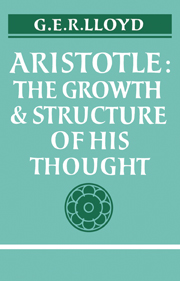Book contents
- Frontmatter
- Contents
- Preface
- Abbreviations
- PART I INTELLECTUAL DEVELOPMENT
- 1 Life and writings
- 2 The pupil of Plato
- 3 The critic of Plato
- 4 The philosopher of nature
- 5 The founder of systematic research
- PART II FUNDAMENTALS OF ARISTOTLE'S THOUGHT
- Suggestions for farther reading
- Glossary of Greek terms
- Index of passages referred to
- General Index
1 - Life and writings
Published online by Cambridge University Press: 06 July 2010
- Frontmatter
- Contents
- Preface
- Abbreviations
- PART I INTELLECTUAL DEVELOPMENT
- 1 Life and writings
- 2 The pupil of Plato
- 3 The critic of Plato
- 4 The philosopher of nature
- 5 The founder of systematic research
- PART II FUNDAMENTALS OF ARISTOTLE'S THOUGHT
- Suggestions for farther reading
- Glossary of Greek terms
- Index of passages referred to
- General Index
Summary
Aristotle was born in 384 b.c. at Stagira, a small town in Chalcidice in northern Greece. His father Nicomachus was court physician to Amyntas, King of Macedon. A modern reader may be surprised that it was an otherwise quite undistinguished city-state, and not Athens or one of the other major cultural centres of Greece, that produced Aristotle. But many brilliant Greek philosophers and scientists came from cities which were of secondary economic importance. The atomist Democritus, for instance, came from Abdera, another small town in northern Greece not far from Stagira. Although Aristotle spent more than half his active life in Athens, he never became an Athenian citizen, and his connections with Macedonia were to prove an embarrassment to him, indeed after the death of Alexander the Great a danger to his life.
The fact that Aristotle's father was a medical man is not without importance, since it suggests that Aristotle was introduced to Greek medicine and biology at an early age. Although we have no information concerning the type of medicine that Nicomachus himself practised or professed, two of the most famous of the so–called Hippocratic treatises demonstrate that at least one notable representative of Greek scientific medicine was at work in northern Greece at the end of the fifth century b.c. These are the first and third books of the Epidemics, which contain casehistories collected from such places as Thasos and Abdera.
- Type
- Chapter
- Information
- AristotleThe Growth and Structure of his Thought, pp. 3 - 18Publisher: Cambridge University PressPrint publication year: 1968

